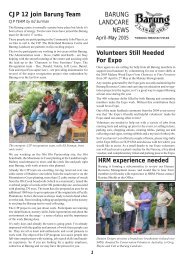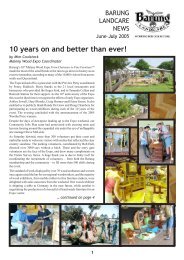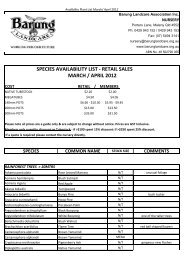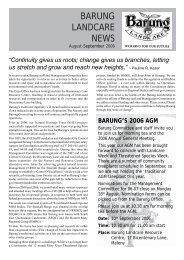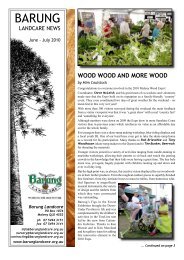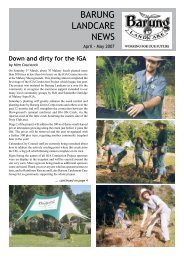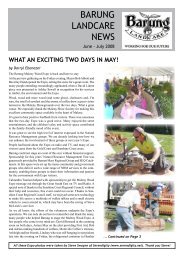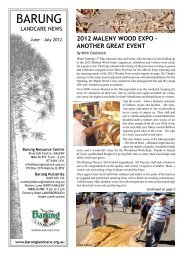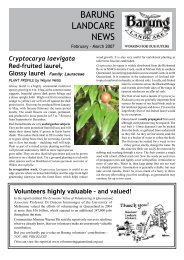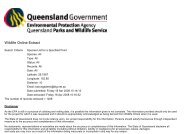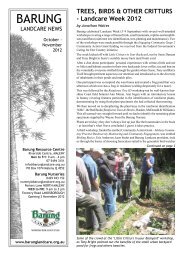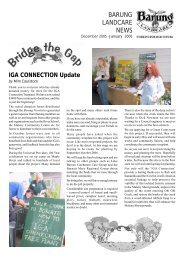Aug/Sep 2005 - Barung Landcare
Aug/Sep 2005 - Barung Landcare
Aug/Sep 2005 - Barung Landcare
You also want an ePaper? Increase the reach of your titles
YUMPU automatically turns print PDFs into web optimized ePapers that Google loves.
<strong>Barung</strong> International<br />
<strong>Landcare</strong><br />
Your <strong>Landcare</strong> Group Needs YOU<br />
John Wightman<br />
Many members of the wider <strong>Barung</strong> <strong>Landcare</strong> Community are<br />
aware our sphere of influence extends well beyond the Sunshine<br />
Coast and Hinterland. Maleny receives many visitors each year<br />
and many find their way to <strong>Barung</strong>. Some just wander in and look<br />
around the nursery. Others come deliberately to learn more about<br />
a ‘conservation group’ that walks and talks at the same time. This<br />
they do by chatting to whomsoever is around while others receive<br />
more formal indoctrination into the meaning of <strong>Landcare</strong> and what<br />
<strong>Landcare</strong> groups can do. Some of these people come from<br />
overseas. But it goes further than that.<br />
Someone who certainly walks and talks at the same time is John<br />
Muir. He was deeply involved for five years in a successful<br />
landcare operation in upland villages in Mindanao, the Philippines,<br />
during 1999-2004. This was a project funded by the Australian<br />
Centre for International Agricultural Research. It is now regarded,<br />
internationally, as a landmark in the evolution of bilaterally<br />
managed agricultural development projects. The community<br />
engagement characteristic of the landcare approach gave the farm<br />
families immediate ownership of proposed changes. This was seen<br />
by people in the Philippines and in Australia to be a much more<br />
effective means of implementing change than the more normal<br />
‘top down’ modalities of agricultural development projects. When<br />
the project ended in June 2004, there were more than 4230 families<br />
in 400 <strong>Landcare</strong> groups across the three project sites on Mindanao<br />
Island. The message from them was ‘give us more!’<br />
The outcome is that AusAID and other international donors have<br />
agreed to support the expansion of this initiative so that it can<br />
extend the lessons learned in the ‘research’ phase, in which<br />
principles of engagement were established, to a much wider<br />
implementation exercise.<br />
The thought in <strong>Barung</strong> is that there may be other people living in<br />
<strong>Barung</strong>’s people catchment area who can contribute significantly<br />
to agricultural and rural development in Asia and the Pacific<br />
Nations. Some people already have experience working in less<br />
developed countries and some have accumulated experience in<br />
Australia and would like to apply it overseas. Others may just<br />
want to give something of themselves to people who have very<br />
little.<br />
At this stage, the <strong>Barung</strong> Management Committee has: 1) a blank<br />
screen, 2) an International Working Group, and 3) a chicken and<br />
egg situation. Do we look for projects or parts of projects we can<br />
link to and look for people to fill them Or do we define our<br />
human resource and then try to find project profiles to fit it As is<br />
normal in life we shall probably do a little of both at the same<br />
time. <strong>Barung</strong> could certainly make an impact in Pacific<br />
communities, and there is some manoeuvring going on in that<br />
direction. At the same time, we need to accumulate an impression<br />
of the people who might be able to contribute to such projects.<br />
Another pressing question: when can/do we move and establish<br />
our own educational and accommodation facility for running<br />
<strong>Landcare</strong> courses We certainly hope that this will be a more<br />
prominent aspect of <strong>Barung</strong>’s future activities. Again, for this, we<br />
need a cadre of experienced people to act as tutors.<br />
At this very early stage we would like to know of anyone who is<br />
interested in participation. (Continued next column).<br />
11<br />
Please let us know – briefly, and with no commitment<br />
on either side – if you are interested in joining <strong>Barung</strong>’s<br />
International <strong>Landcare</strong> team, indicating whether:<br />
• you have previous experience of working in a developing<br />
country and what it was<br />
• you have experience you feel might be of value in an overseas<br />
development project.<br />
• you feel you have no specialist experience but would like to<br />
‘learn as you go’<br />
• you could contribute as a tutor to <strong>Landcare</strong> training courses<br />
on topics relevant to the needs of overseas people and in which<br />
subject areas you can help.<br />
Consider whether you are thinking in terms of offering yourself<br />
for a long period of work overseas (6 months, 3 years), or for<br />
periods of weeks at a time.<br />
Send to <strong>Barung</strong>, by email, fax, or snail mail, or hand, a written<br />
expression of your interest, or contact John Wightman on 5429<br />
6550 or at intipm@ipmmaleny.com<br />
Limited opportunities =<br />
Confused students<br />
A TRAINEE’S TALE by Jake Smith-Moloney<br />
Hello readers, it’s time for another instalment of my regular<br />
newsletter contribution.<br />
The topic of this article is devoted to all the students currently<br />
studying to complete their Year 12 assignments and tests. A long<br />
time ago (in a galaxy far, far away), I finished High School and I<br />
had an extremely vague idea of the direction I wanted to head in.<br />
With a general interest in both science and ecology I decided to<br />
pursue further education in the form of a BSc Environmental<br />
Science Degree. This in turn lead me towards Green Corps and<br />
onto my traineeship at <strong>Barung</strong>. And now I reckon my occupational<br />
position couldn’t get much better. I love my job!<br />
My point is that I knew the general direction I wanted to head in<br />
at the end of High School, and this has paid off.<br />
As the class of <strong>2005</strong> prepare to graduate, they need to know about<br />
exciting avenues for the future, so I am going to approach Maleny<br />
State High School to see if I can talk to interested students about<br />
my experiences in tertiary education and environmental work. I<br />
will determine whether there is any interest in environmental<br />
occupations, and hope to encourage such interests through<br />
discussion and education about local environmental issues.<br />
I would also like to approach local environmental employers about<br />
taking on High School graduates and creating opportunities for<br />
work and/or training in their fields of expertise. Encouraging<br />
programs such as Green Corps and promoting the advantages of<br />
local traineeships and apprenticeships may increase local youth<br />
involvement in the community and perhaps help stem the mass<br />
exodus of High School graduates from small towns to the big city<br />
as they seek increased opportunities for work and tertiary<br />
education.<br />
As always, I am contactable at <strong>Barung</strong> most of the time during<br />
the week but you can also email me at Ze_Bacon@hotmail.com<br />
if you have any comments or ideas to help me out. By the time<br />
you are reading this I will have completed the first full year of my<br />
traineeship, woo hoo! Hope I can continue on at the same pace<br />
and finish within the next two years or so. Until next time, try to<br />
keep warm and enjoy this winter.



